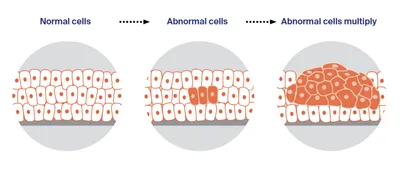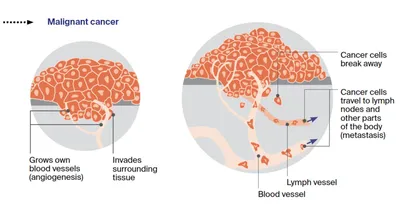How cancer starts
Normally, cells multiply and die in an orderly way, so that each new cell replaces one lost. Sometimes, however, cells become abnormal and keep growing. These abnormal cells may turn into cancer.
In solid cancers, such as lung or bowel cancer, the abnormal cells form a mass or lump called a tumour. In some cancers, such as leukaemia, the abnormal cells build up in the blood.
Not all tumours are cancer. Benign tumours tend to grow slowly and usually don’t move into other parts of the body or turn into cancer. Cancerous tumours, also known as malignant tumours, have the potential to spread. They may invade nearby tissue, destroying normal cells. The cancer cells can break away and travel through the bloodstream or lymph vessels to other parts of the body.
The cancer that first develops in a tissue or organ is called the primary cancer. It is considered localised cancer if it has not spread to other parts of the body.
How cancer spreads
If the primary cancer cells grow and form another tumour at a new site, it is called a secondary cancer or metastasis. A metastasis keeps the name of the original cancer. For example, breast cancer that has spread to the liver is called metastatic breast cancer, even though the main symptoms may be coming from the liver.









